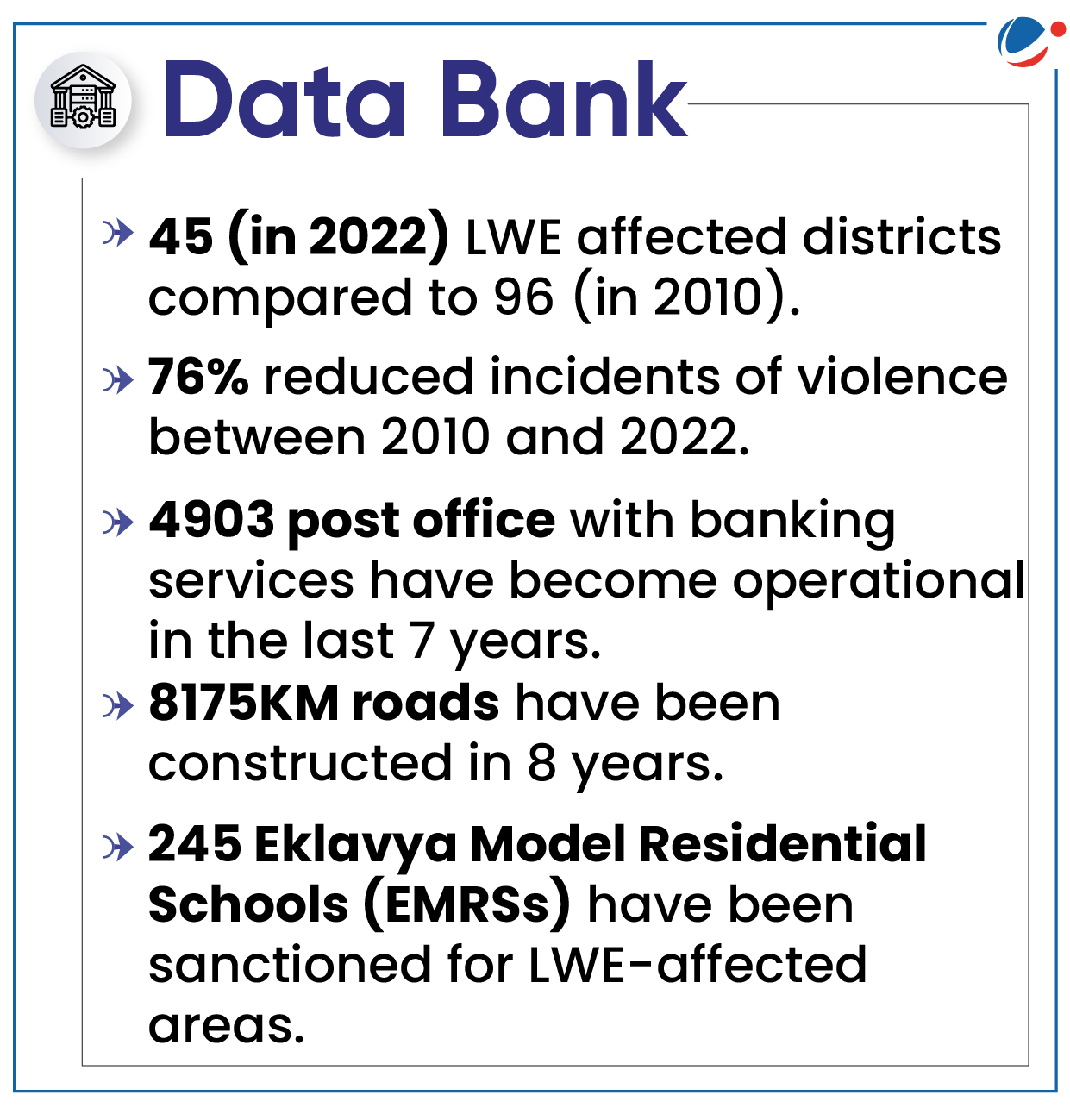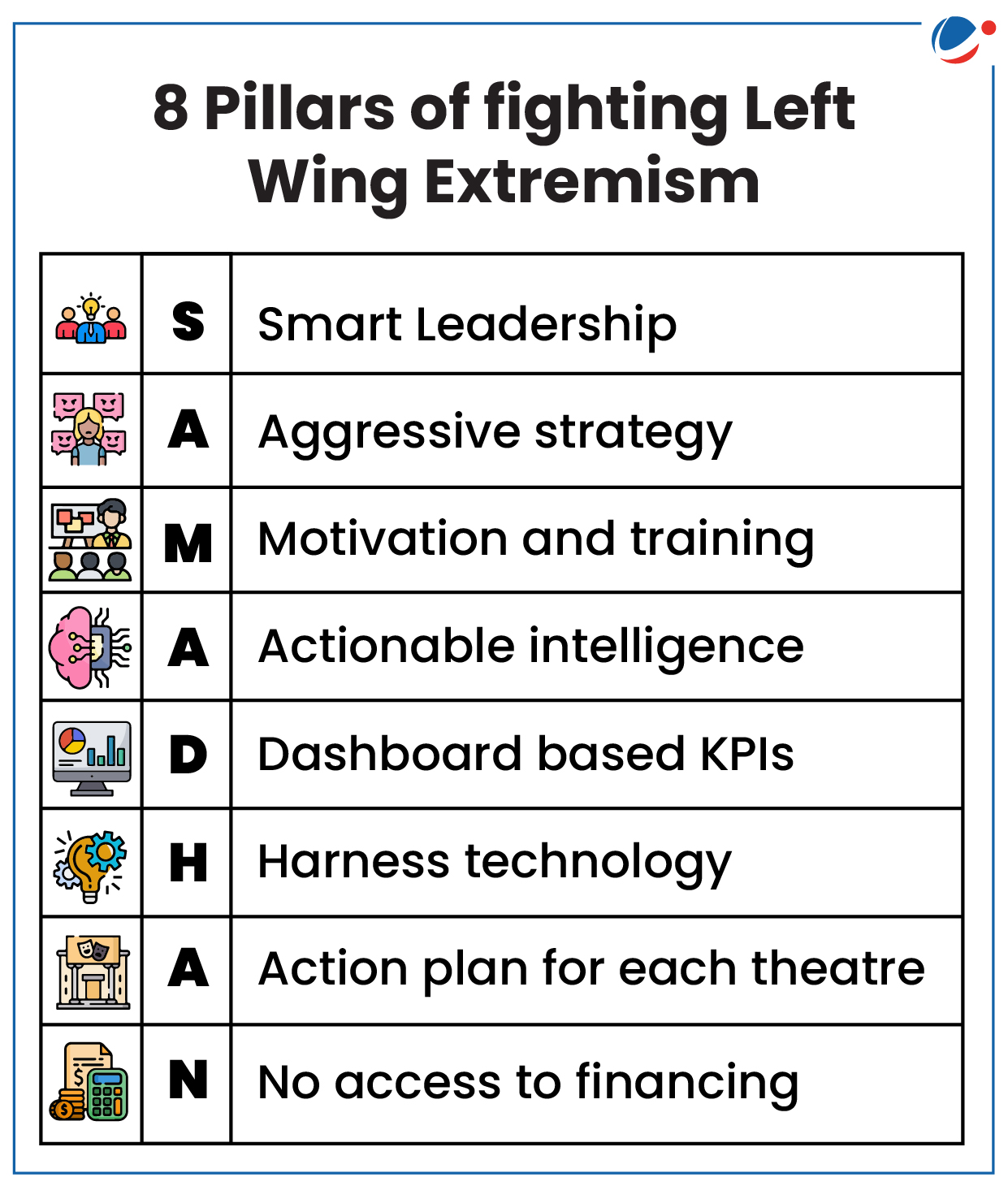Why in the news?
Recently, the Union Ministry of Home Affairs (MHA) released a booklet titled 'Decisive Battle with Left Extremism'.
Left-Wing Extremism (LWE) in India
- LWEs are individuals or groups who espouse radical leftist ideologies and seek to overthrow established systems of power through violent means.
- LWEs are commonly referred to as Maoists globally and as Naxalites within India.
- Naxal insurgency in India originated in the 1967 uprising in Naxalbari, West Bengal.
- India's Red Corridor: Chhattisgarh, Jharkhand, Odisha, Bihar, West Bengal, Andhra Pradesh, Telangana, Maharashtra, Madhya Pradesh, and Kerala in varying degrees.
Factors responsible for the emergence of LWE
- Jal, Jungle, Jameen (Water, Forest and Land): Forced labour, expropriation of resources by outsiders, evasion of land ceiling laws, denial of land claims and poorly framed legislations are curtailing the rights of people in LWE-affected areas.
- Socio-Economic Inequalities: Lack of employment and education opportunities, Infrastructure deficit, absence of healthcare amenities, and social exclusion compelled youth to join Naxalite organisations.
- Insurgency historically flourished in areas where poverty has taken root.
- Inadequate Governance: Several reports suggest that government policies are not properly implemented on the ground led to rise of Naxalism.

Reasons for the decline in LWE in India
- Strategic
- SAMADHAN: The new operational Doctrine 'SAMADHAN' was enunciated to tackle LWE by MHA in 2017. (refer image)
- Special Taskforce: Special operation teams formed in centre and state forces.
- Offensive strategy: In 2022, security forces have achieved unprecedented success in Operation Octopus, Operation Double Bull, and Operation Chakrabandha in fight against LWE.
- Developmental
- Better centre-state coordination: The government has made funds available for the capacity building of states under various schemes such as the Security related expenditure (SRE) scheme, and the Special Infrastructure Scheme (SIS).
- Public participation in Development: The MHA has ensured people's participation by giving additional thrust to the scheme for the welfare of the poor and the development of militancy-affected areas.
- Rehabilitation: The government's surrender and rehabilitation policies offer incentives like vocational training, and financial assistance aiding their integration into mainstream society.
- For instance, Industrial Training Institutes and Skill Development Centres have been established in LWE-affected districts.
- Improved Development and Governance: Initiatives focusing on education, employment generation etc. have reduced the grievances that fuelling extremism.
Challenges persist to control Left Wing Extremism
- Geographical Location: The continuous forest terrain of states like Jharkhand, Chhattisgarh, Orissa, and Telangana have allowed the Maoists/Naxals a free space to conduct arms training, hide themselves and carry out guerrilla warfare.
- Security Challenges: Unhindered inflow of arms and ammunition to Naxalites, through illicit manufacturers, stealing from government stocks, inadequate monitoring and surveillance etc., poses a significant security threat in LWE areas.
- Slow pace of political reforms and participatory democracy: There is a lack of political representation of marginalized communities, particularly tribal populations.
- Ideological Appeal: LWE groups have constructed a narrative that attracts people, particularly from tribal communities to join the Naxalite movement.

Way ahead
- Bridging trust deficit: Employ more local people in the administrative process which can act as a bridge to curtail trust deficit. Further, support of civil society can be taken for awakening tribals.
- For example, the Peace March was organized in 2021 where tribals from Chhattisgarh, Odisha and Telangana participated under the slogan of 'Bastar maange hinsa se azadi'.
- Counter Ideological appeal: Cherish and nurture the democratic way of life deeply enshrined in our Constitution, as opposed to the totalitarian and oppressive nature of the Maoist ideology.
- Centre-state coordination: Both should make synchronised efforts in eliminating radicalization and clear delineation of roles and responsibilities should be delineated to tackle LWE.
- Security and Capacity building: Emphasis should be laid on the modernization of local police forces, and forces should be used in small groups to maintain greater efficiency.
- Use of technology: Geographic information system and Global Positioning System can help in identifying camp locations and planning attacks to eradicate threats by security forces in LWE areas/red corridor.



